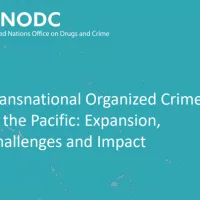
The Pacific is increasingly becoming an important transshipment hub and an operational and destination point for organized crime syndicates, according to a new report launched Friday by the UN Office on Drugs and Crime (UNODC).
Titled Transnational Organized Crime in the Pacific: Expansion, Challenges, and Impact, the report provides a detailed analysis of the rapidly evolving organized crime landscape and related drivers. It highlights how foreign criminal groups are capitalizing on the region’s geographic isolation, infiltrating legitimate businesses and using new technologies to advance their illicit operations while evading law enforcement.
“Transnational organized crime has become a significant security threat in the Pacific, raising serious concerns for the region and its people,” said Baron Waqa, Secretary-General of the Pacific Islands Forum Secretariat (PIFS), during the launch in Suva, which brought together senior government officials from Fiji, representatives from neighboring countries and international partners.
“PIFS welcomes this crucial report as it sheds light on the nature of the challenges we face and helps shape our collective regional response,” Waqa added.
Identified trafficking routes of cocaine impacting the Pacific.
The report reveals that foreign crime syndicates, primarily from Asia and the Americas, are exploiting the Pacific’s strategic location to traffic illicit drugs and other contraband. The region’s isolation, once considered a barrier, now provides these groups with opportunities to operate in less-patrolled waters, facilitating large-scale shipments through ship-to-ship transfers.
UNODC’s research also brings to the forefront the alarming rise in methamphetamine use across several Pacific countries, particularly Fiji, Papua New Guinea and Tonga, posing significant public health risks.
“The rising methamphetamine use is alarming but not entirely unexpected, given the increasing illicit drug trade along major trafficking routes,” said Matthew David Watson, UNODC’s lead advisor in the Pacific on transnational organized crime.
“We are also seeing a worrying trend of organized crime groups posing as legitimate businesses in key sectors such as hospitality and pharmaceuticals, using technological innovations to conceal their operations. This complicates the efforts of law enforcement agencies in the Pacific and carries implications for major markets in Australia and New Zealand.”



